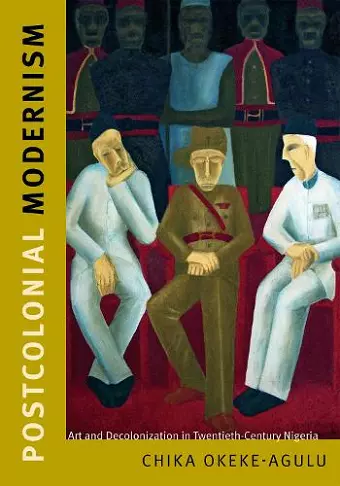Postcolonial Modernism
Art and Decolonization in Twentieth-Century Nigeria
Format:Paperback
Publisher:Duke University Press
Published:2nd Mar '15
Should be back in stock very soon

Written by one of the foremost scholars of African art and featuring 129 color images, Postcolonial Modernism chronicles the emergence of artistic modernism in Nigeria in the heady years surrounding political independence in 1960, before the outbreak of civil war in 1967. Chika Okeke-Agulu traces the artistic, intellectual, and critical networks in several Nigerian cities. Zaria is particularly important, because it was there, at the Nigerian College of Arts, Science and Technology, that a group of students formed the Art Society and inaugurated postcolonial modernism in Nigeria. As Okeke-Agulu explains, their works show both a deep connection with local artistic traditions and the stylistic sophistication that we have come to associate with twentieth-century modernist practices. He explores how these young Nigerian artists were inspired by the rhetoric and ideologies of decolonization and nationalism in the early- and mid-twentieth century and, later, by advocates of negritude and pan-Africanism. They translated the experiences of decolonization into a distinctive "postcolonial modernism" that has continued to inform the work of major Nigerian artists.
“As a book that documents the trajectory of colonial and post-colonial states of visual arts in Nigeria, Okeke-Agulu’s Postcolonial Modernism is no doubt a compact scholarly work that highlights the dynamics of the past and politics of a period that could have been the Nigerian renaissance in the post-independence era.” - Tajudeen Sowole (The Guardian (Lagos)) “Through contemporary documentation, such as the magazine Black Orpheus, which published criticism, reviews, portfolios, and well-chosen illustrations, Okeke-Agulu offers thorough formalist and analytical readings of works of art. Knowledge of Nigerian artists Aina Onabolu, Bruce Onobrakpeya, Demas Nwoko, Simon Okeke, Yusuf Grillo, El Anatsui, and Jimo Akolo, as well as those who supported and promoted their work, such as Ulli Beier and Kenneth Murray, is broadened without delving into the minutiae of biography. … Recommended. All levels of undergraduates and above.” - M. R. Vendryes (Choice)
“The book unfolds dramatically, tracing the trajectory of Nigerian history from the colonial era through the euphoric independence years to the tragic aftermath of the post-independence period. Its seven chapters constitute an engrossing page-turner and offer a cathartic crescendo which climaxes when the author invokes Mbari--ephemeral, elaborate earthen monuments to the lgbo goddess Ala in its final pages. . . . One of this text's greatest accomplishments is the way in which it calls attention to ... under-appreciated work, while carefully situating it within a larger, sociopolitical context.”
- Carol Thompson (Art Papers) “Chika Okeke-Agulu’s thoroughly researched and beautifully illustrated Postcolonial Modernism significantly advances an understanding of modern African art. …[A] major contribution to the fields of modern African art and global modernisms. For readers unfamiliar with modern Nigerian art, it serves as a comprehensive introduction. For those who study modern Nigerian and African art, the figures, movements, and artistic concerns will be largely familiar, but Okeke-Agulu examines them with unprecedented depth and complexity, while situating them within a broader global context.” - Rebecca Wolff (CAA Reviews) "The book is an enormously valuable contribution to our understanding of Nigerian art history, both in its text and its 127 illustrations, many of which will be new to many scholars.... It is a book that belongs in the library of every scholar interested in African art history, Nigeria, modernism, and postcolonial studies." - Jean M. Borgatti (International Journal of African Historical Studies) "With textured analyses of artworks from unpublished archives, Okeke-Agulu’s research enriches the field of art history by offering the Nigerian experience of modernism as impetus to seek out other modernisms from the Global South. Informative for scholars in the field of African studies, this book is equally legible for undergraduate and graduate courses, or even for nonspecialists who are searching for meaningful ways to rethink the existing, incomplete narratives concerning modernity and Africa." - Joseph L. Underwood (Art Journal) "When I first picked up this handsome book, a sense of wonder swept over me.... Readers will surely take from this wonderful book a new appreciation for twentieth-century Nigerian art and its role in postcolonial modernism." - Monica Blackmun Visonà (Art Bulletin) "Chika Okeke-Agulu’s book on art and decolonization is an extensive and highly detailed investigation of the emergence of artistic modernism in Nigeria from the late 1950s to the civil war in 1967. . . . The book is without doubt a significant contribution to the study of mid- to late twentieth-century Nigerian art. However, it is important to recognize Postcolonial Modernism has the potential to appeal not only to scholars, but also to a broader audience."- Fred Smith (H-AfrArts, H-Net Reviews) "This book offers readers a complex study into the development of Nigerian modernism within a wider political, cultural, and artistic context of decolonization. Chika Okeke-Agulu successfully achieves a delicate balancing act, keeping the individual artists and their work at the center of this critical enquiry while also analyzing how they were connected to a wider art world context."
- Helena Cantone (African Studies Quarterly)
ISBN: 9780822357469
Dimensions: unknown
Weight: 1043g
376 pages